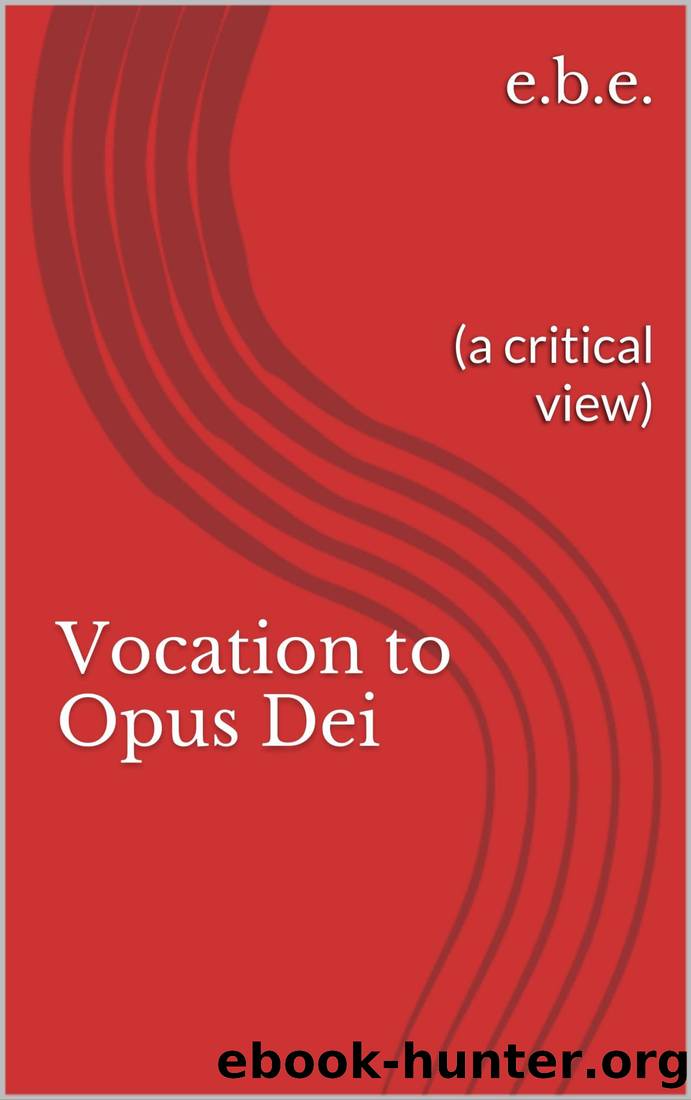Vocation to Opus Dei by E.B.E

Author:E.B.E.
Language: eng
Format: mobi
***
Let us see now the second point: the states of perfection and Opus Dei.
«Clearly the juridical forms proper to religious orders and congregations or to societies in some way equivalent to them whose members live a complete dedication but in a theological context of public consecration and, to one degree or other, of separation form the world and its activities were not suitable.»[83]
Public consecrations were not suitable for Opus Dei. Would private consecration be suitable for it? Let us quote again some words from Alvaro del Portillo that reflect the lifestyle model that Escrivá had in mind and was not different from the religious life.
«In an old paper written by the Father, I read that if state is “stabilis vivendi modus”, seeking the Christian perfection permanently according to particular norms is state of perfection: but he wanted that situation remains in the internal forum.»[84]
Escrivá was interested in the internal forum more than in the external habit. Apparently, he did not want Opus Dei members were religious, in the classic sense, but lay people with a commitment similar to religious, who would hardly know about their own deep identity beyond the lay dress.
Those who live in state of perfection or are incorporated to a secular institute do not hide their condition. In the case of Opus Dei, the vocation has a peculiar element: the state of perfection has to remain in the internal forum. Using the same words of Escrivá for vows, we could say, «its members live the state of perfection, but Opus Dei ignore that situation». Members themselves are unaware that their lives are proper to the state of perfection. The difference is that Opus Dei chooses to ignore that situation, whereas for members it is not a choice but something really unknown.
The fact that the vocation is a matter of “internal forum” implies two things: it is not possible to talk openly about it except with Opus Dei’s directors (who are, at the same time, superiors and spiritual directors, despite Opus Dei denies that it could happen), and secondly, it has no public manifestation, the vocation has to remain unnoticed.
«In order for the Institute to reach its proper end more effectively, it wishes to live as hidden, therefore it abstains from collective acts and does not have a name or common denomination by which its members are called. Given the character of the Institute, which externally does not desire to appear publicly as a society, it is not appropriate that its members should engage collectively in certain manifestations of cult like processions.»[85]
This characteristic of “discretion” is something that almost has not changed with the arrival of the personal prelature, as it is the case of the state of perfection.
«Opus Dei did not promote a new state of perfection or modify the religious state.»[86]
However, as we saw, Opus Dei welcomed the new state of perfection proclaimed by Provida Mater Ecclesia and there were grounds for that.
«The state of perfection, as regulated by the Law, does not mean other thing than the admission, by the church authority, of the theological state of perfection.
Download
This site does not store any files on its server. We only index and link to content provided by other sites. Please contact the content providers to delete copyright contents if any and email us, we'll remove relevant links or contents immediately.
The Motivation Myth by Jeff Haden(5213)
Audition by Ryu Murakami(4932)
Adulting by Kelly Williams Brown(4574)
The Confidence Code by Katty Kay(4262)
A Mind For Numbers: How to Excel at Math and Science (Even If You Flunked Algebra) by Barbara Oakley(3307)
Waiting in the Wings by Melissa Brayden(3220)
Self-Esteem by Matthew McKay & Patrick Fanning(3144)
Fooled by Randomness: The Hidden Role of Chance in Life and in the Markets by Nassim Nicholas Taleb(3124)
The ONE Thing by Gary Keller(3071)
Nice Girls Don't Get the Corner Office by Lois P. Frankel(3046)
The Dictionary of Body Language by Joe Navarro(2999)
How to be More Interesting by Edward De Bono(2793)
Designing Your Life by Bill Burnett(2748)
Getting Things Done by David Allen(2701)
The Plant Paradox by Dr. Steven R. Gundry M.D(2624)
Police Exams Prep 2018-2019 by Kaplan Test Prep(2549)
What Color Is Your Parachute? 2015 by Richard N. Bolles(2311)
Dangerous Personalities by Joe Navarro(2290)
When to Jump by Mike Lewis(2241)
